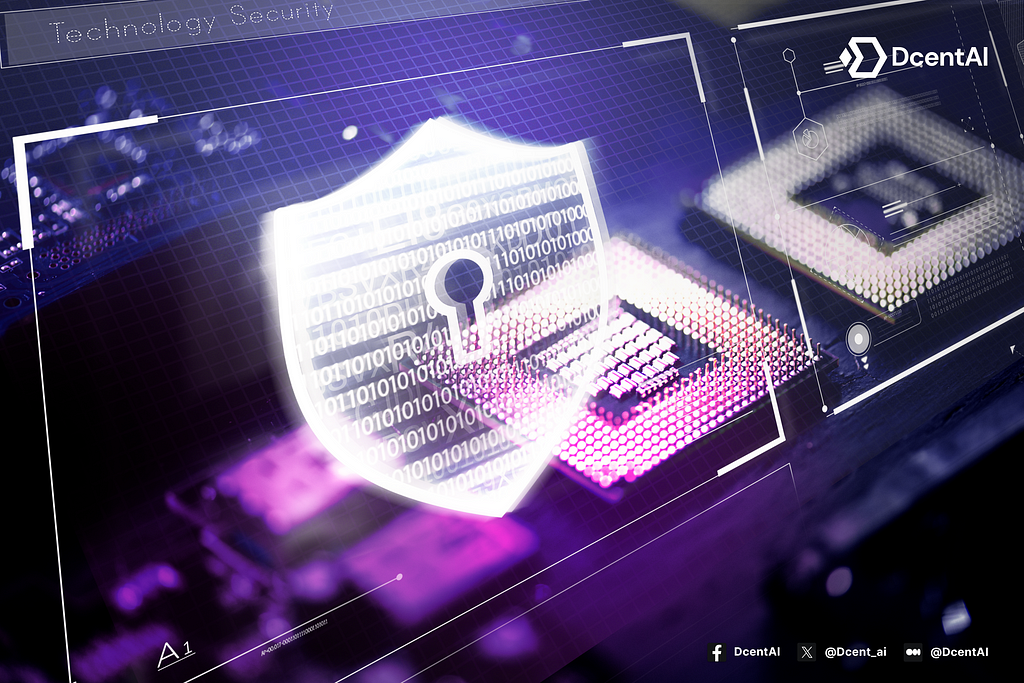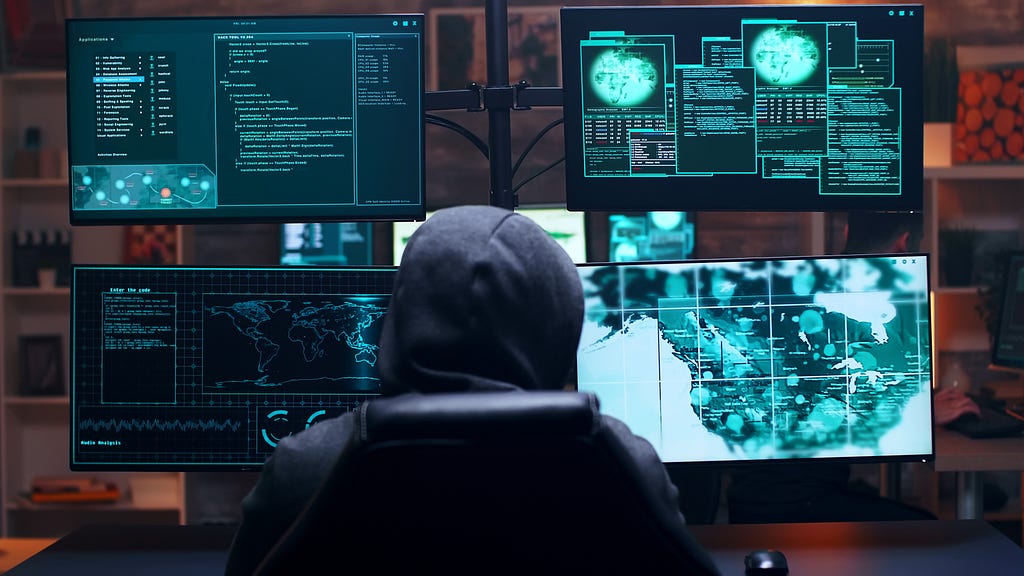Quantum Computing and AI: Exploring the Synergies and Future Prospects in Decentralized Networks

In the current period of digital advancements, cybersecurity plays a vital part due to the rising number and modernity of cyber threats. Both businesses and individuals must guarantee the proper assurance of sensitive information and fundamental framework.
Decentralized AI emerges as a progressive remedy, offering advanced real-time functionalities to distinguish, prevent, and address cyber-attacks effectively.Using a decentralized nature, security systems can become more resilient and flexible, lowering vulnerabilities and refining overall protection.
DcentAI is at the forefront of this breakthrough, leveraging decentralized networks to improve cybersecurity measures. DcentAI’s distributed strategy assures that threat detection and response processes are faster and less prone to single points of failure. In this article, we will look at how decentralized AI improves cybersecurity, including its applications and benefits, and the critical role of DcentAI in this changing scenario.
Cybersecurity Challenges in Centralized SystemsDue to their structural design, centralized frameworks inherently pose significant cybersecurity challenges. Centralized structures with a single control point are highly susceptible to cybercriminals. Complete network control can be achieved, leading to potentially disastrous consequences if an attacker attains unauthorized access. The centralized nature of these frameworks further magnifies the difficulty in instantly identifying and addressing attacks, as their monolithic design often hinders timely threat response.
Common Cyber Threats and Attacks
Centralized networks are particularly vulnerable to various cyber threats and attacks. Some of the most common are:
- DDoS attacks: DDoS attacks occur when a system is overwhelmed by an influx of requests, causing network outages and service interruptions.
- Data breaches: Data breaches involve unauthorized entry into sensitive information, which can result in compromised confidentiality and integrity, as well as significant financial and reputational damage.
- Malware and ransomware: Malware and ransomware are types of malicious software that can disrupt operations, steal data, or restrict system access until a ransom is paid.
- Phishing and social engineering: Phishing and social engineering tactics trick individuals into revealing confidential information, often leading to further exploitation.
- Insider Threats: Insider Threats occur when employees or trusted individuals misuse their access to intentionally or unintentionally harm the organization.
These challenges emphasize the essential weaknesses of centralized systems in terms of robust cybersecurity, paving the way for further flexible options like decentralized AI to address these critical issues adequately.
Decentralized AI Approaches to CybersecurityHere’s how decentralized AI can mitigate cybersecurity threats:
Anomaly Detection and Threat PreventionDecentralized AI can improve cybersecurity by utilizing improved anomaly detection and threat prevention capabilities. Systems that use distributed AI algorithms can monitor network behavior across numerous nodes in real-time. This decentralized approach enables faster detection of anomalous patterns or actions that indicate potential cyber dangers. Machine learning models trained on broad datasets from many sources can detect anomalies with better accuracy and sensitivity, allowing for early warnings and rapid responses to avert cyber attacks before they cause significant damage. DcentAI integrates these advanced anomaly detection capabilities into its platform to offer robust cybersecurity solutions.
Blockchain for Secure TransactionsCoordinating blockchain innovation and decentralized AI provides a solid alternative for secure transactions. The blockchain’s decentralized ledger architecture ensures that all transactions are transparent and immutable without a central authority. It diminishes the risk of data altering and fraud since each transaction is cryptographically secure and recorded over various nodes. When integrated with AI, blockchain allows secure data sharing and transactions. At the same time, AI algorithms analyze blockchain data to identify and mitigate potential security concerns, maintaining the integrity and security of digital transactions. DcentAI uses blockchain technology to safeguard transactions and ensure data integrity.
Decentralized Identity ManagementDecentralized AI also plays an essential part in enhancing identity management. Traditional centralized identity operation systems are vulnerable to breaches, with a single point of failure potentially exposing massive quantities of sensitive particular information. In contrast, decentralized identity operation spreads the responsibility for validating and storing identity information across numerous nodes, lowering the risk of unauthorized access. AI algorithms can manage and validate identities in real-time, allowing only authorized individuals to access sensitive data and systems. This method improves security and gives users more control over their particular information, fostering privacy and trust.
Mitigating Vulnerabilities Of Centralized Networks with DcentAIHere’s how DcentAI can mitigate centralized network vulnerabilities:
Decentralized InfrastructureCentralized networks are particularly delicate to single points of failure, where a breach or breakdown in one portion of the system might jeopardize the entire network. DcentAI addresses this issue by utilizing a decentralized infrastructure. Distributing data and processing over various nodes decreases the impact of a single point of failure. If one node is compromised, the network remains secure, ensuring the system’s continuing operation and integrity.
Enhanced Data EncryptionData breaches in centralized networks often occur because data is stored in a single location, making it an attractive target for hackers. DcentAI enhances data security through advanced encryption techniques. Data at the source remains encrypted during transmission and storage across the decentralized network. It guarantees that even if data is intercepted or accessed by unauthorized parties, it remains unreadable and unusable without the correct decryption keys.
Real-Time Threat DetectionCentralized networks can respond slowly to emerging threats due to the time required to detect, analyze, and mitigate issues through a centralized point. DcentAI addresses this by implementing real-time threat detection across its decentralized nodes. AI algorithms persistently monitor network activity, analyzing patterns and behaviors to recognize potential dangers. This decentralized approach permits quicker discovery and response, effectively neutralizing hazards before they can cause significant damage.
Distributed Ledger TechnologyCentralized systems frequently struggle to ensure the integrity and validity of transactions and records. DcentAI uses distributed ledger technology (DLT), such as blockchain, to improve security. DLT guarantees that all transactions and data changes are transparently recorded and cannot be changed. This immutable record-keeping strategy significantly diminishes the threat of data altering and fraud by guaranteeing that all network transactions are irrefutable and reliable.
Autonomous Security ProtocolsCentralized networks often require manual intervention to update security protocols and patch vulnerabilities, which can be slow and inconsistent. DcentAI leverages AI-driven autonomous security protocols that automatically update and adapt to new threats. These protocols are distributed over the decentralized network, guaranteeing all nodes are reliably secured with the most recent security measures without requiring manual upgrades.
Real-World Implementations of Decentralized AI in Cybersecurity
Here are some of the real-world implementations of decentralized AI in cybersecurity:
Cortex LabsUtilizing blockchain innovation and decentralized frameworks, Cortex Labs uses decentralized AI to upgrade cybersecurity across diverse applications. It encourages secure and transparent transactions, minimizing the potential for fraud and unauthorized access. Their AI models diligently monitor network activity to recognize and foresee cyber attacks in real-time, giving strong security against data breaches and hacking.
NumeraiNumer.ai, a hedge fund that uses a decentralized network of information researchers, uses decentralized AI to secure its data. By encrypting information and distributing it all through a decentralized network, Numerai diminishes the threat of data breaches. Their decentralized AI models examine encrypted data to forecast market movements while maintaining data integrity and security.
Ocean ProtocolOcean Protocol utilizes decentralized artificial intelligence to empower secure data sharing across businesses. It uses blockchain innovation to guarantee that information transfers are transparent and immutable, eliminating the danger of alteration. Their AI algorithms empower secure information sharing between parties, which improves cybersecurity by keeping data safe and private throughout its lifecycle.
Fetch.aiFetch.ai uses decentralized AI to construct secure, autonomous agents that work in various industries, including cybersecurity. These agents employ decentralized networks to share information and interact in real-time, allowing for faster threat detection and response. Fetch.ai’s strategy ensures that cybersecurity measures are constantly updated and adapted to new threats, resulting in strong protection against cyber attacks.
To Sum It UpIn an era where cyber attacks are becoming more complex and broad, decentralized AI presents a practical elective for making strides in cybersecurity. Decentralized artificial intelligence increases risk detection, limits unauthorized access, and secures transactions by eliminating vulnerabilities inherent in centralized frameworks using blockchain and federated learning technologies.
DcentAI and other organizations are setting the standard by adopting robust decentralized AI systems that enable real-time protection and resilience against cyber assaults.As decentralized AI advances, establishing a more secure digital landscape becomes increasingly essential, paving the path for a safer and more dependable cyberspace.
To learn more about DcentAI, visit our Facebook and X accounts.Become a pioneer of DcentAI community!Enhancing Cybersecurity with Decentralized AI was originally published in Coinmonks on Medium, where people are continuing the conversation by highlighting and responding to this story.
